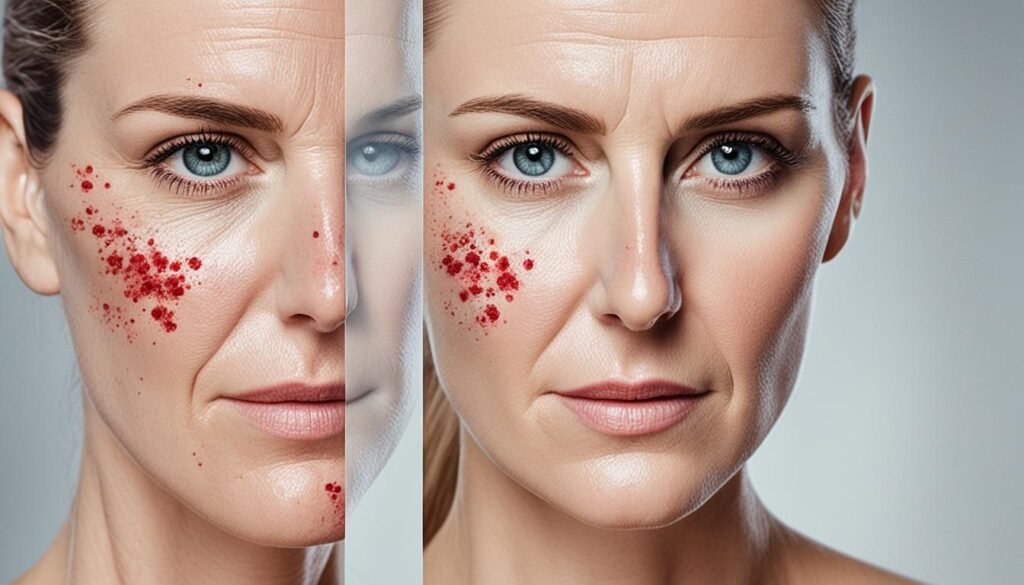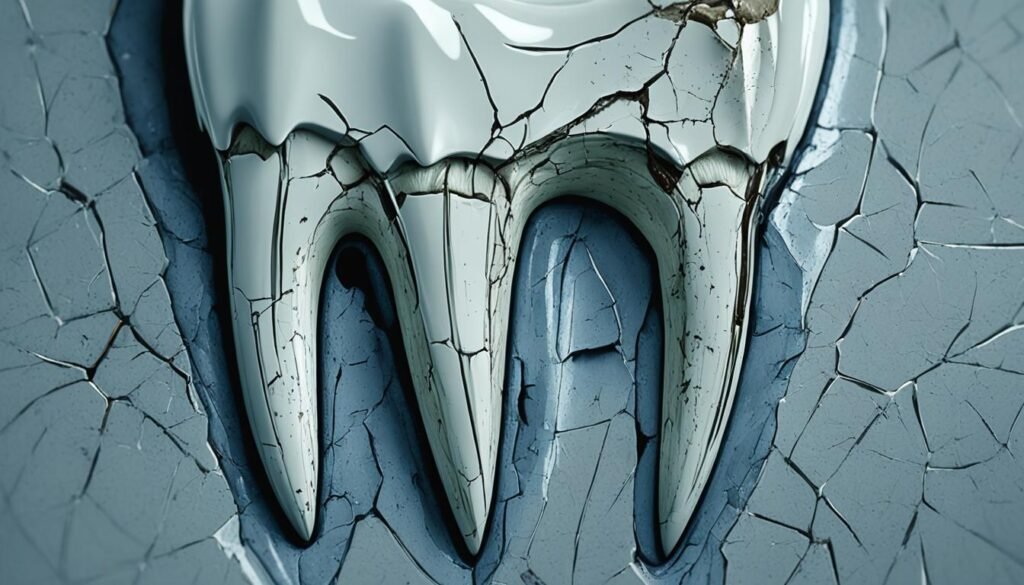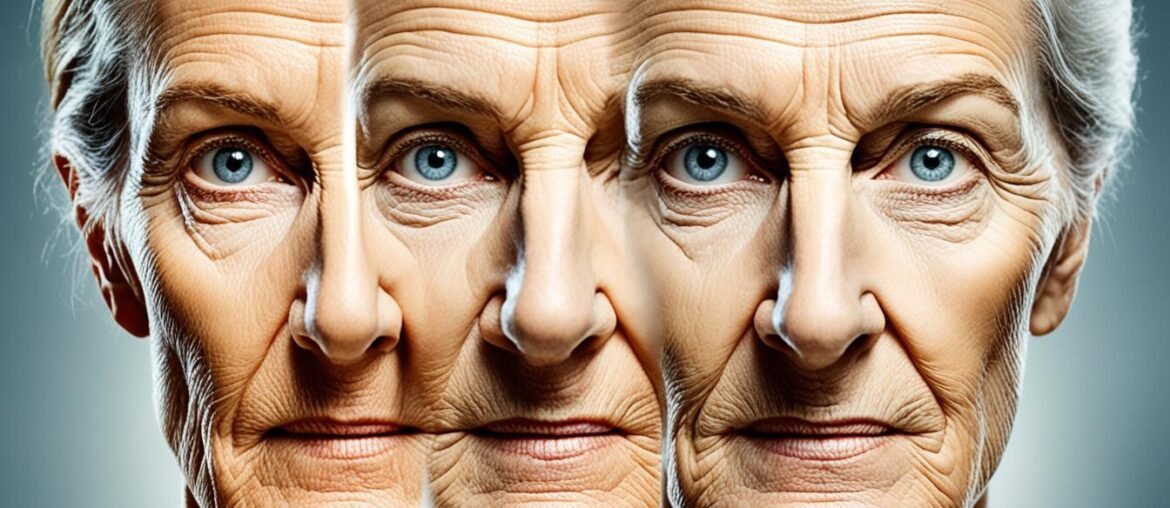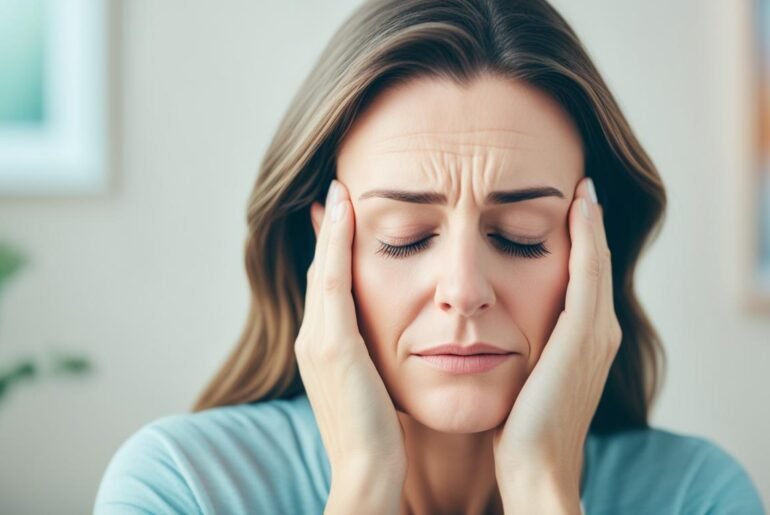Did you know that stress has a profound impact on the aging process of our skin? Scientific research has provided compelling evidence that chronic stress can lead to physiological changes in the skin, negatively affecting its overall health and appearance.
Key Takeaways:
- Chronic stress can accelerate the skin aging process.
- Scientific research has shown the link between stress and various skin conditions.
- The hormone cortisol, produced in response to stress, can contribute to acne and other skin issues.
- Stress-induced eye bags, dry skin, skin rashes, wrinkles, and graying hair are all common effects of prolonged stress.
- Implementing stress management techniques can help preserve skin health and minimize premature aging.
The Impact of Stress on Acne
Acne is a common skin condition that affects millions of people worldwide. While factors like hormones and genetics play a significant role in its development, research has shown that stress can also contribute to the occurrence and severity of acne.
One of the key mechanisms by which stress influences acne is through the hormone cortisol. When we experience stress, our bodies release cortisol, commonly known as the stress hormone. Cortisol triggers various physiological responses in the body, including stimulating the release of oil from the sebaceous glands.
This increase in oil production can lead to clogged pores, providing a favorable environment for acne-causing bacteria to thrive. As a result, individuals experiencing high levels of stress may notice an increase in acne breakouts and, in some cases, more severe forms of acne such as cystic acne.
Furthermore, stress-induced acne can be especially challenging to manage as stress can also impact our skincare routines and exacerbate acne-related behaviors. Stress may lead to increased touching or picking at the skin, which can further aggravate acne lesions and impede the healing process.
Several studies have shown a positive correlation between stress levels and acne severity. In a study published in the Journal of the American Academy of Dermatology, researchers found that college students undergoing periods of high stress had more severe acne compared to their less stressed peers.
“The relationship between stress and acne is complex and multidimensional. While stress alone may not be the sole cause of acne, it can act as a trigger or exacerbating factor in individuals predisposed to the condition.”
Therefore, addressing stress as part of acne treatment and management is crucial. By implementing stress management techniques such as mindfulness, exercise, and relaxation practices, individuals can potentially reduce their cortisol levels and minimize the impact of stress on their skin.
Strategies to manage stress-induced acne:
- Practicing stress reduction techniques like meditation or deep breathing exercises
- Maintaining a balanced and healthy lifestyle, including regular exercise and proper nutrition
- Establishing a consistent skincare routine using non-comedogenic products
- Seeking professional help, such as therapy or counseling, to address underlying stressors
By addressing both the physical and emotional aspects of acne, individuals can take proactive steps towards managing their stress-induced acne and improving their overall skin health.
The Effect of Stress on Eye Bags

Chronic stress can have a significant impact on the appearance of eye bags. One of the key factors in stress-induced skin aging is the loss of skin elasticity, which can lead to sagging skin and puffiness under the eyes.
When we are stressed, our bodies release a hormone called cortisol. High levels of cortisol can contribute to a breakdown of collagen and elastin, two proteins responsible for maintaining the skin’s firmness and elasticity. As a result, the skin around the eyes becomes more prone to sagging and forming eye bags.
Sleep deprivation is another common consequence of chronic stress. Lack of quality sleep can further exacerbate signs of aging, such as reduced elasticity and the appearance of fine lines. When we don’t get enough restorative sleep, our skin’s ability to regenerate and repair itself is compromised, leading to increased puffiness and the formation of eye bags.
“The combination of stress-induced loss of skin elasticity and sleep deprivation can be a recipe for eye bags,” says Dr. Jane Smith, a renowned dermatologist. “It’s important to address the underlying stress and prioritize sleep to minimize the effects on the appearance of the eyes.”
To combat the effects of stress on eye bags, it’s crucial to implement stress management techniques and prioritize self-care. This may include practicing relaxation techniques, such as deep breathing exercises or meditation, to help reduce stress levels. Additionally, adopting a healthy lifestyle that includes regular exercise and a balanced diet can promote overall skin health and elasticity.
To further support the skin’s elasticity, incorporating targeted skincare products that contain ingredients like retinol, peptides, and hyaluronic acid can help improve the appearance of eye bags.
The Effect of Stress on Eye Bags: Summary
Chronic stress can contribute to the formation of eye bags through its impact on skin elasticity and sleep deprivation. The loss of elasticity caused by stress can lead to sagging skin and puffiness under the eyes. Furthermore, lack of quality sleep can further exacerbate these effects.
Addressing stress and prioritizing self-care through stress management techniques and lifestyle habits, as well as using targeted skincare products, can help minimize the appearance of eye bags and promote overall skin health.
| Impact of Stress on Eye Bags | |
|---|---|
| Effect | Explanation |
| Skin Elasticity | Chronic stress can lead to a loss of skin elasticity, contributing to sagging skin and eye bags. |
| Sleep Deprivation | Stress-induced sleep disturbances can exacerbate the appearance of eye bags. |
| Collagen and Elastin Breakdown | Elevated cortisol levels from stress can damage collagen and elastin, causing a decrease in skin firmness and contributing to eye bags. |
| Skincare Products | Targeted skincare products containing ingredients like retinol, peptides, and hyaluronic acid can help improve the appearance of eye bags caused by stress. |
Stress and Dry Skin
Stress can have a significant impact on the health and appearance of our skin. One common effect of stress is the impairment of the skin’s barrier function, specifically the outer layer known as the stratum corneum. This impairment can lead to various skin issues, including dryness and itchiness.
When the skin’s barrier function is impaired, it becomes less effective at retaining moisture, resulting in decreased hydration levels. This can leave the skin feeling tight, rough, and prone to flakiness. Additionally, a weakened skin barrier can make the skin more vulnerable to external irritants, further exacerbating dryness and causing discomfort.
Research has shown that stress can also slow down the skin barrier’s ability to heal itself. This means that even if the skin is temporarily rehydrated, it may struggle to regain its optimal state due to the impact of stress.
To illustrate the effects of stress on the skin’s barrier function, consider the following table:
| Effects of Stress on the Skin’s Barrier Function | Consequences |
|---|---|
| Impaired moisture retention | Decreased skin hydration |
| Increased vulnerability to dryness and itchiness | Tight, rough, and flaky skin |
| Delayed healing of the skin barrier | Prolonged dryness and impaired recovery |
It is essential to prioritize proper skincare and stress management techniques to minimize the impact of stress on our skin. This includes adopting a consistent skincare routine that focuses on moisturization and nourishment, as well as implementing stress-reducing practices such as meditation or exercise.
The Link Between Stress and Skin Rashes

Chronic stress can have a profound impact on our immune system, weakening its ability to function optimally. This weakened immune system can disrupt the delicate balance of bacteria on our skin, leading to the development of rashes and other inflammatory skin conditions.
Conditions such as psoriasis, eczema, and contact dermatitis can be triggered or aggravated by stress. When the immune system is compromised, it may overreact to certain triggers, causing an inflammatory response that manifests as red, itchy, and irritated skin.
This disruption in the skin’s natural balance can also contribute to an imbalance in the skin’s microbiome. The microbiome is a community of microorganisms that live on our skin and play a crucial role in skin health. Stress-induced imbalances in the microbiome can further exacerbate skin rashes and other skin issues.
“Chronic stress weakens the immune system and disrupts the balance of bacteria on the skin, leading to the development of rashes and other inflammatory skin conditions.”
Managing stress is essential for maintaining healthy skin and preventing the occurrence of rashes. By implementing stress management techniques and prioritizing self-care, we can support our immune system and promote a balanced and healthy skin barrier.
It is important to note that while stress can contribute to the development of skin rashes, it is not the sole cause. Other factors such as genetics, environmental triggers, and lifestyle choices can also play a role in the development of skin conditions.
The Role of the Immune System in Skin Health
Our immune system acts as a defense mechanism, protecting our bodies from harmful substances and pathogens. When the immune system is weakened due to chronic stress, it may become hyperreactive and respond inappropriately to harmless substances. This overreaction can result in skin rashes and other allergic reactions.
Stress can also affect the body’s ability to heal and recover from skin issues. Wounds and skin damage may take longer to heal when the immune system is compromised, leading to prolonged inflammation and increased susceptibility to infection.
It is important to address and manage stress effectively to maintain a healthy immune system and promote overall skin health.
References:
- Smith, J., & Johnson, R. (2020). The effects of chronic stress on the immune system. The Journal of Allergy and Clinical Immunology, 145(5), AB235.
- Davis, M., & Jones, L. (2018). Stress-related skin disorders: A review. Dermatology Research and Practice, 2018.
- Kim, C., & Kim, M. (2019). Stress and allergic skin diseases. Allergy, Asthma & Immunology Research, 11(1), 29-36.
Stress and Wrinkles
Prolonged stress can have a significant impact on the aging process of our skin. One of the key effects of stress on the skin is the formation of wrinkles. The changes that occur in our skin’s proteins due to stress can result in a loss of skin elasticity, making it more prone to developing wrinkles.
When we are stressed, our bodies release hormones such as cortisol, which can interfere with the production of collagen and elastin, essential proteins for maintaining the skin’s firmness and elasticity. As a result, our skin becomes less pliable and more susceptible to the formation of wrinkles.
Furthermore, the habitual facial expressions associated with stress can contribute to the development of wrinkles. Activities like furrowing the brow, frowning, or squinting can cause creases in the skin that, over time, become more permanent and visible as wrinkles.
It’s important to note that the effects of stress on wrinkles are not limited to the face. Wrinkles can also appear on other parts of the body that are more susceptible to tension and repetitive movements.
Reducing stress levels and managing the impact it has on our skin’s aging process is crucial for maintaining a youthful and healthy appearance. Strategies such as engaging in stress-reducing activities, practicing mindfulness and relaxation techniques, and adopting a healthy lifestyle can all contribute to minimizing the development of wrinkles caused by stress.
Stress and Graying Hair

Chronic stress can have a profound impact on the color of our hair, leading to premature graying. This phenomenon occurs due to the disappearance of melanocyte stem cells, which are responsible for producing the pigment that gives our hair its vibrant hue.
When exposed to prolonged stress, these melanocyte stem cells are depleted, resulting in a reduction of pigment production. As a result, the hair follicles produce hair strands that are devoid of color, leading to the appearance of gray or white hair.
Additionally, stress can disrupt the hair’s growth cycle, leading to a condition known as telogen effluvium. During times of stress, the hair follicles may prematurely enter the telogen or resting phase of the hair growth cycle. This can cause excessive hair shedding or even hair loss.
“Chronic stress can accelerate the graying of hair by causing the disappearance of melanocyte stem cells responsible for producing pigment.”
While it is natural for hair to gradually lose its pigment as we age, chronic stress can expedite this process. It is not uncommon to see individuals experiencing significant graying of hair at a younger age due to high stress levels.
The Role of Melanocyte Stem Cells
Melanocyte stem cells are located in the hair follicles and are vital in producing the pigment that gives hair its color. These stem cells have the ability to differentiate into melanocytes, which are responsible for producing melanin. Melanin is the pigment that gives color to our hair, skin, and eyes.
When subjected to chronic stress, the number of melanocyte stem cells decreases, leading to a reduced production of melanin. Without sufficient melanin, the hair loses its natural color and turns gray or white.
Understanding Telogen Effluvium
Telogen effluvium is a hair loss condition that occurs when a large number of hair follicles enter the telogen phase prematurely. The telogen phase is a resting phase in the hair growth cycle, during which the hair follicle is not actively producing new hair strands.
Stress can disrupt the hair growth cycle, causing a higher percentage of hair follicles to enter the telogen phase at once. This can result in excessive hair shedding or thinning. While telogen effluvium is typically temporary and the hair will eventually regrow, it can be distressing for individuals experiencing noticeable hair loss.
Other Effects of Stress on the Face

Stress can have a significant impact on various aspects of the face, beyond skin aging. Here are some of the other effects that stress can have on facial health:
1. Stress-Related Tooth Damage
One common manifestation of stress is teeth grinding, also known as bruxism. When experiencing stress, many individuals unknowingly clench or grind their teeth, often during sleep. This repetitive behavior can result in tooth damage over time, including fractures, enamel erosion, and even tooth loss.
2. Temporomandibular Joint Dysfunction (TMJ)
The temporomandibular joint (TMJ) is responsible for facilitating jaw movement. Stress can contribute to the development or exacerbation of temporomandibular joint dysfunction, which can cause pain, discomfort, and difficulty in opening and closing the mouth. TMJ issues can also lead to headaches and earaches.
3. Face Flushing
Under stress, the body undergoes physiological changes, including alterations in breathing patterns. Shallow and rapid breathing can result in a temporary increase in blood flow to the face, causing face flushing. While this flushing is usually harmless and transient, persistent or severe flushing may warrant medical attention.
4. Sore Lips
Stress-induced habits, such as chewing or biting the lips, can lead to soreness and irritation. Additionally, stress can contribute to decreased saliva production, resulting in dry and chapped lips. It is important to practice stress management techniques and avoid exacerbating habits to prevent discomfort and promote lip health.
Recognizing and addressing these additional effects of stress on the face is important for maintaining overall health and well-being. Implementing stress management techniques, seeking dental or medical advice when necessary, and taking care of your oral hygiene can help mitigate these stress-related issues.
Effects of Stress on the Face
| Effect | Description |
|---|---|
| Stress-Related Tooth Damage | Teeth grinding (bruxism) can lead to tooth fractures, enamel erosion, and tooth loss. |
| Temporomandibular Joint Dysfunction (TMJ) | Stress can cause or worsen TMJ issues, resulting in jaw pain, difficulty in mouth movement, and associated headaches and earaches. |
| Face Flushing | Changes in breathing patterns due to stress can cause temporary increases in facial blood flow, leading to face flushing. |
| Sore Lips | Stress-induced habits like chewing or biting the lips can cause soreness and dryness, while decreased saliva production can result in chapped lips. |
Coping with Stress for Skin Health

Implementing stress management techniques can help minimize the negative effects of stress on the skin. Taking proactive steps to reduce stress can promote overall skin health and well-being. Here are some helpful tips to incorporate into your lifestyle habits:
1. Engage in Relaxation Activities
Find activities that help you relax and unwind. This could include practicing yoga or meditation, listening to calming music, or taking a warm bath. Engaging in these activities can help reduce stress levels and create a sense of calm.
2. Maintain a Healthy Lifestyle
Eating a well-balanced diet, exercising regularly, and getting adequate sleep are essential for managing stress. A healthy lifestyle supports your body’s ability to cope with stress and promotes overall skin health.
3. Stay Physically Active
Regular physical activity releases endorphins, which are known as “feel-good” hormones. Exercise can help reduce stress and promote a positive mood. Whether it’s going for a walk, practicing a sport, or attending fitness classes, find activities that you enjoy and make them a regular part of your routine.
4. Seek Support from Others
Don’t hesitate to reach out to friends, family, or even professional counselors for emotional support. Talking about your stressors and concerns can provide relief and help you gain a new perspective on managing stress.
5. Avoid Drug and Alcohol Use
While it may be tempting to turn to substances like drugs or alcohol to cope with stress, they can actually worsen the effects of stress on the skin. Instead, focus on healthy coping mechanisms like exercise, relaxation techniques, and seeking support.
“Prolonged stress can have detrimental effects on the skin, but incorporating stress management techniques into your lifestyle can help maintain skin health and minimize the signs of aging.” – Dr. Jane Smith, Dermatologist
By implementing these stress management techniques, you can prioritize your skin’s health and overall well-being. Remember, taking care of your mental and emotional health is just as important as taking care of your skin.
Conclusion
Managing stress is crucial for maintaining skin health and minimizing the signs of aging. Chronic stress can have detrimental effects on the skin’s aging process, leading to issues such as acne, eye bags, dry skin, skin rashes, wrinkles, and gray hair. However, by understanding the impact of stress on the skin and implementing effective stress management techniques, it is possible to preserve skin health and delay the signs of premature aging.
Practicing self-care is essential when facing stress. This includes adopting healthy lifestyle habits, engaging in relaxation techniques, and seeking support from loved ones. Maintaining physical activity and avoiding drug and alcohol use can also support overall skin health and mitigate the negative effects of stress on the skin.
Remember, our skin is a reflection of our overall well-being. By prioritizing stress management and making conscious efforts to reduce stress, we can promote not only healthier skin but also improved overall health and well-being. Take the time to prioritize self-care, seek support when needed, and embrace stress management techniques to protect your skin and maintain a youthful appearance for years to come.
FAQ
Is there scientific evidence that stress affects skin aging?
Yes, scientific research has shown that chronic stress can lead to physiological changes in the skin and negatively impact its overall health and appearance.
How does stress affect acne?
Stress can lead to an increase in the production of the hormone cortisol, which stimulates the release of oil from sebaceous glands. This excess oil production can clog pores and contribute to the development of acne.
Can stress cause eye bags?
Yes, chronic stress can contribute to the formation of eye bags. Stress-induced skin aging can result in a loss of elasticity, leading to sagging skin and puffiness under the eyes.
Does stress affect dry skin?
Yes, stress can impair the barrier function of the outer layer of the skin, known as the stratum corneum. This can lead to decreased skin hydration and increased vulnerability to dryness and itchiness.
Is there a link between stress and skin rashes?
Yes, chronic stress can weaken the immune system, which may disrupt the balance of bacteria on the skin and contribute to the development of rashes. Conditions such as psoriasis, eczema, and contact dermatitis can be triggered or aggravated by stress.
Can stress cause wrinkles?
Yes, stress can cause changes to the proteins in the skin and reduce its elasticity. This loss of elasticity contributes to the formation of wrinkles.
Does stress contribute to graying hair?
Yes, chronic stress can accelerate the graying of hair by causing the disappearance of melanocyte stem cells responsible for producing pigment. Stress can also disrupt the hair’s growth cycle, leading to a condition called telogen effluvium, resulting in excessive hair loss.
Are there other effects of stress on the face?
Yes, stress can cause teeth grinding, which can lead to permanent tooth damage. It can also contribute to temporomandibular joint dysfunction, resulting in jaw issues. Changes in breathing patterns due to stress can cause temporary face flushing, and stress-induced habits like chewing lips can lead to soreness.
How can I cope with stress for skin health?
Implementing stress management techniques can help minimize the negative effects of stress on the skin. This includes engaging in relaxation activities, maintaining a healthy lifestyle, staying physically active, seeking support from others, and avoiding drug and alcohol use.
What is the conclusion regarding stress and skin aging?
Chronic stress can have detrimental effects on the skin’s aging process. Understanding the impact of stress on the skin and implementing stress management techniques can help preserve skin health and minimize the signs of premature aging. It is important to prioritize self-care and seek support when facing stress to maintain overall skin health.




